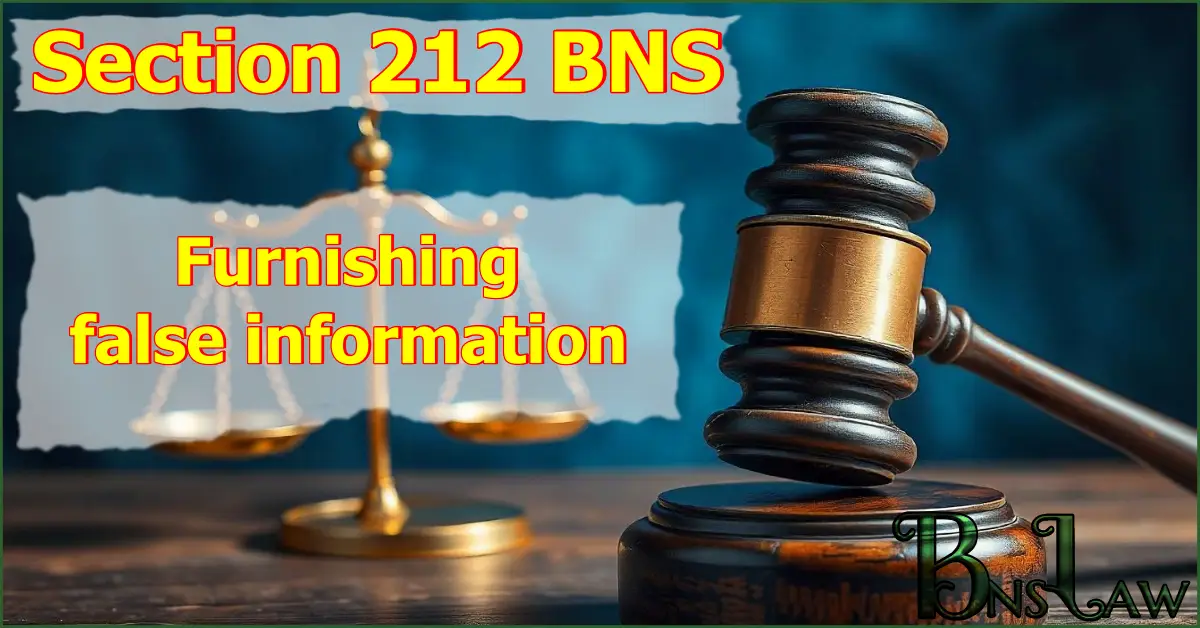Section 212 BNS | BNS 212
Whoever, being legally bound to furnish information on any subject to any public servant, as such, furnishes, as true, information on the subject which he knows or has reason to believe to be false,—
212(a) BNS
shall be punished with simple imprisonment for a term which may extend to six months, or with fine which may extend to five thousand rupees, or with both;
212(b) BNS
where the information which he is legally bound to give respects the commission of an offence, or is required for the purpose of preventing the commission of an offence, or in order to the apprehension of an offender, with imprisonment of either description for a term which may extend to two years, or with fine, or with both.
Illustration
(a) A, a landholder, knowing of the commission of a murder within the limits of his estate, wilfully misinforms the Magistrate of the district that the death has occurred by accident in consequence of the bite of a snake. A is guilty of the offence defined in this section.
(b) A, a village watchman, knowing that a considerable body of strangers has passed through his village in order to commit a dacoity in the house of Z, a wealthy merchant residing in a neighbouring place, and being legally bound to give early and punctual information of the above fact to the officer of the nearest police station, wilfully misinforms the police officer that a body of suspicious characters passed through the village with a view to commit dacoity in a certain distant place in a different direction. Here A is guilty of the offence defined in this section.
READ OTHER SECTIONS OF CHAPTER XIII — OF CONTEMPTS OF THE LAWFUL AUTHORITY OF PUBLIC SERVANTS
FAQs of BNS Section 212
-
212 BNS punishment and fine
Punishment and fine under Section 212 of the BNS—
212(a): Simple imprisonment for 6 months, or fine of 5,000 rupees, or both.
212(b): Imprisonment for 2 years, or fine, or both. -
212 BNS cognizable or not
The offence under Section 212(a) and 212(b) of the BNS are non-cognizable.
-
212 BNS bailable or not
The offence under Section 212(a) and 212(b) of the BNS are bailable.
-
212 BNS trial court
Offence specified in Section 212(a) and 212(b) of the BNS is triable by any Magistrate.
Important Points
- Cognizable Offences: These are offences where a police officer can arrest a person without a warrant.
- Non-Cognizable Offences: These are offences where a police officer cannot arrest a person without a warrant.
- Bailable Offences: These are offences where the accused can get bail from the police station itself. All bailable offences are listed in the First Schedule of the Bharatiya Nagarik Suraksha Sanhita (BNSS).
- Non-Bailable Offences: Offences in which bail is not granted directly from the police station but after hearing the case in the court, the judge decides when bail will be granted. All non-bailable offences are listed in the first schedule of the Bharatiya Nagarik Suraksha Sanhita (BNSS).
- In the above FAQ, “trial court” means the court that has jurisdiction to try the offence.
- In the above FAQ, the expression “Magistrate of the first class” and “Any Magistrate” does not include Executive Magistrates.
Read other Sections of the BNS
Reference Link: New Criminal Laws (BNS), Ministry of Home Affairs







